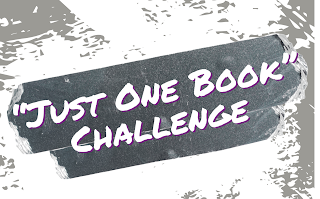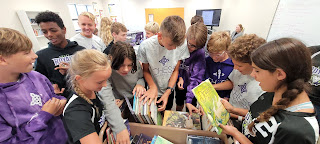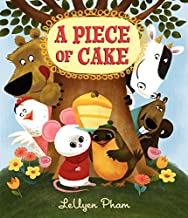"Just One Book"
September 03, 2022We did it! The first two weeks of school of school are in the books, and what a great start!
We had some challenges and adjustments, as can be expected with the transition of getting back into the school routine, but we had many joys and triumphs as well, and the launch of our independent choice Reading program (for grades 3-9) ranked high in our list of victories. We were so excited to watch many of the best parts of The Book Whisperer come to life right in front of us, almost always in organic, student-driven ways, and now we're all the more eager to watch the rest of the year unfold!
Students and teachers talked about books, and students shared book ethusiasm with each other as everyone chose and dove into their first book. I loved watching this! It's just the way this whole thing is supposed to work, and it happened almost immediately.
Naturally, this was met with some doubt! But after announcing this, I pulled over a cart of picture books that I had chosen for their narrative quality and the range of genres they represented. This led to a mini "book frenzy," similar to what Donalyn Miller describes in The Book Whisperer, and it was so much fun.
It also opened the door for crucial conversations about choice!
"Those aren't real books!"
"Can we just read 40 picture books? I could do that in a day!"
So we talked about what makes a real book as well as why picture books can certainly have literary value (it's important to note, for one thing, that picture books often have sophisticated vocabulary and are typically written for experienced readers to read to less experienced ones, not necessarily for young children to read independently), but also about why they won't work for every book that our middle schoolers have to read. Those reasons vary, but in most cases, it's because if a student can read a picture book in thirty minutes or less (and they all did!), they're ready for more of a challenge.
This is one of the best parts of independent reading, - freedom to say no, empowerment to say yes, and a growing understanding of the personal responsibility that comes with that choice. Our students rose to the challenge on day one, and this was beautiful to watch.
They can do this!
On a final note, it should be noted that during the reading time that followed, everyone read. Everyone read. This is a great time to be reminded that what we ask of our students we should also model, so reading time should be all-inclusive. Our students have busy schedules, too, and if they can do it, so can we! Take some time to read as your children read - you might be surprised by what happens to your own reading life as well!
 |
| Silent reading takes practice! It's not always easy for everyone to be still, quiet, and focused on a book for 20-30 minutes, but these kids did it! |
.jpg) |
| I love reading in general, so to make this a challenge for myself, I chose a graphic novel I wouldn't typically read. |





.png)
.png)
.png)



.png)

0 comments